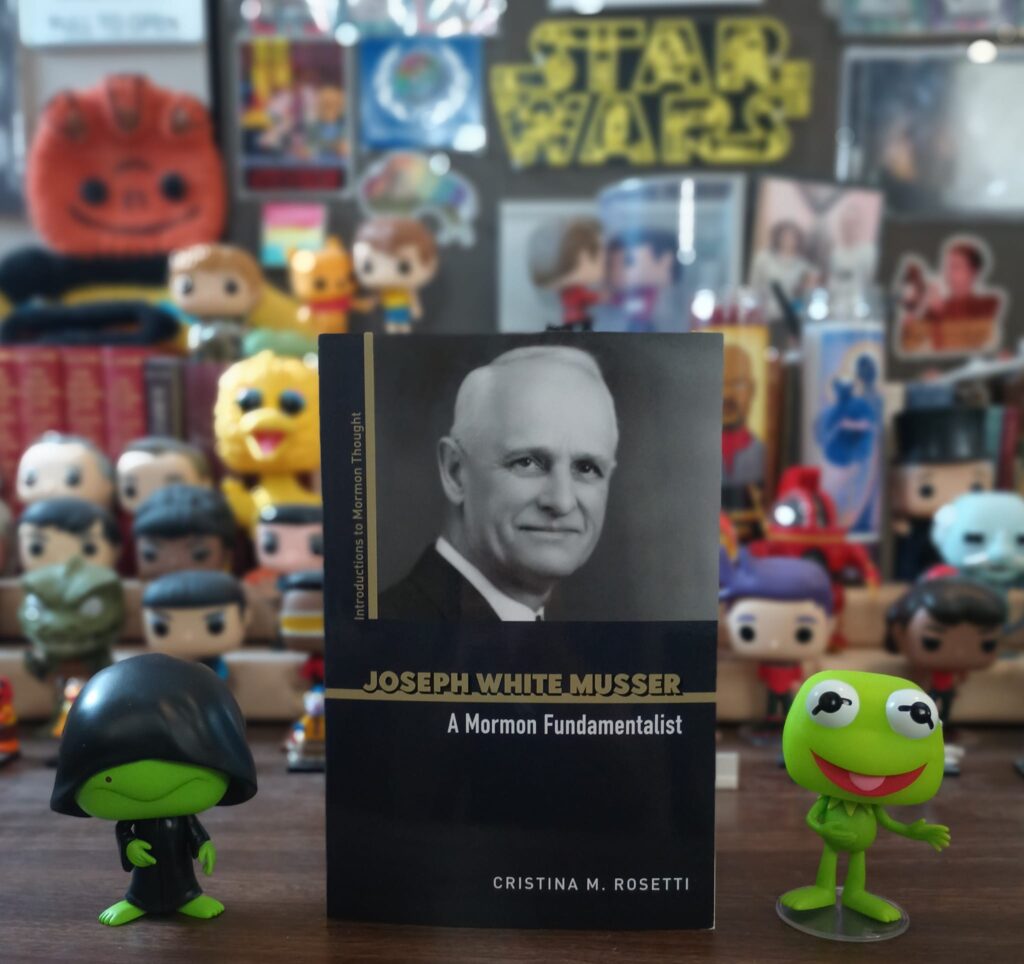Review
———
Title: Joseph White Musser: A Mormon Fundamentalist
Author: Cristina M. Rosetti
Publisher: University of Illinois Press
Genre: Religious Non-fiction
Year Published: 2024
Number of Pages: 112 pages
Format: Paperback
ISBN: 978-0-252-08775-2
Price: $14.95
Reviewed by Conor Hilton for the Association of Mormon Letters
Cristina M. Rosetti’s Joseph White Musser: A Mormon Fundamentalist is an illuminating and fascinating book about one of Mormon fundamentalism’s foundational thinkers. Rosetti weaves together a compelling narrative about Saint Joseph White Musser’s place in Mormon thought, pulling from his biography, shifting policies and teachings in the Church of Jesus Christ of Latter-day Saints, and Musser’s extensive writings. The book persuasively demonstrates the deeply Mormon nature of Musser’s, and by extension, various fundamentalist expressions of Mormonism, thought.
The book begins, like other entries in the Introductions to Mormon Thought series, with a biography of the book’s central figure. Rosetti summarizes Musser’s relationship to Mormonism, saying, “Like many others during that time, Musser’s excommunication was not the end of his involvement in Mormonism but the beginning of his participation in a religious movement that sought to preserve a vision of Joseph Smith’s religious innovation lost in the twentieth century” (1). Here, Rosetti explicitly draws attention to the continued, insistent Mormon-ness of Musser’s thought. Being raised in the Latter-day Saint tradition, I often heard implicit, and explicit, denials of how ‘Mormon’ or ‘committed’ polygamists or other Mormon fundamentalists were. One important thing, among many, that this book does is demonstrate the falsehood of those assertions.
I thoroughly enjoyed reading about the specifics and intricacies of Musser’s theological innovations, forced by the necessity of his personal circumstances, and theological convictions, to re-imagine what Mormon theology could be. One such innovation is Musser’s expansion of Brigham Young’s Adam-God teachings. Rosetti says, “Musser developed a Mormon cosmology that included a hierarchy of gods in an unbroken chain of priesthood that descends from the heavens” (39). This hierarchy of gods becomes a ‘Trinity’ of gods for this earth, composed of Adam, Jesus, and Joseph Smith. The cosmology is centered around the priesthood, thinking of ‘God’ as a priesthood office (an idea remarkably similar to a conceit for a speculative fiction story I wrote a few years ago, unknowingly channeling Musser!).
One of the central pieces of Musser’s priesthood innovations is separating the Church, meaning the Church of Jesus Christ of Latter-day Saints, from the priesthood. Rosetti says, “By dating the priesthood’s restoration before the Church’s organization, Musser articulated an apologetic solution for men retaining their priesthood once they lost their Church membership” (46). Rosetti traces the ways that Musser uses church history and theological statements from past church leaders, notably the Journal of Discourses, to articulate a new vision of priesthood, that comes to shape and define the fundamentalist movement.
In Rosetti’s telling, Musser’s focus on priesthood defined how he thought about polygamy and the United Order, which became the central pieces of his theological innovations. Musser’s focus on the United Order seems related to the financial hardships he faced, including the Great Depression. Musser’s hopes of implementing the United Order occurred alongside the Church’s establishment of their welfare program. As Rosetti narrates this history and Musser’s thought, she notes that “members of the Church did not gravitate away from government assistance. Utah residents differed with their church leaders in their views on government welfare. Most supported Franklin D. Roosevelt’s second presidential nomination and New Deal policies, despite their leadership’s outspoken opposition to the Democratic candidate” (72). I am always fascinated by examples of disagreement between church members and church leaders and so found this particular historical tidbit insightful.
Joseph White Musser: A Mormon Fundamentalist is a must-read for those curious about the theological innovations at the foundation of Mormon fundamentalism and anyone interested in exploring the spectrum of Mormon theological speculation. Cristina Rosetti’s book is a quick, meaty introduction to Saint Joseph White Musser and his thinking, packed with interesting insights, compelling quotes, and provocative observations that I’ll be returning to frequently. The book is a worthy addition to the excellent Introductions to Mormon Thought series and well worth your time.

